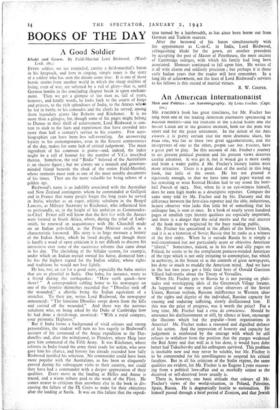BOOKS OF THE DAY
A Good Soldier
EVERY soldier, we are reminded, carries a field-marshal's baton in his knapsack, and here in ringing, simple tones is the story of a soldier who has seen the dream come true. It is one of those heroic stories from another world in which the sharp realities of living, even of war, are softened by a veil of glory—that is, until German bombs in the concluding chapter break in upon enchant- ment. Then we get a glimpse of the man as, full of years, honours, and kindly words, he looks back to the courts of kings and princes, to the rich splendours of India, to the Anzacs whom he led in battle, to his comrades and the chiefs he served, among them legendary giants like Roberts and Kitchener. It is no more than a glimpse, for, though some of his pages might belong to Dumas in their thrill of achievement, Lord Birdwood is con- tent to stick to the facts and experiences that have crowded into more than half a century's service to his country. Few auto- biographies can have been less self-revealing. An unswerving loyalty to his contemporaries, even in the fiercest controversies of the day, makes for some lack of critical judgement. The main ingredient of his comment is praise—and, indeed, the index might be a roll of honour for the number of V.C.s inscribed therein. Somehow, the real " Birdie" beloved of the Australians is an elusive figure ; but we always see a staunch and generous- minded friend beneath the cloak of the senior Field-Marshal, whose memoirs must rank as one of the most notable documents of his times. They are the more valuable for being echoes of a golden age.
Birdwood's name is so indelibly associated with the Australian and New Zealand contingents whom he commanded at Gallipoli and in France that many people forget the long years he served in India, whether as an eager, athletic subaltern in the Bengal Lancers, as Military Secretary to Kitchener, who influenced him so profoundly, or, at the height of his ambition as Commander- in-Chief. Fewer still will know that the first tks with the Anzacs were formed in South Africa, where, during the relief of Lady- smith, he renewed an acquaintance with Mr. Churchill made on an Indian polo-field, as the Prime Minister recalls in a characteristic foreword. His story is in large measure a history of the Indian Army, which he loved deeply, and though there is hardly a word of open criticism it is not difficult to discern his uneasiness over some of the successive reforms that came about in his day. The abolishing of the Sillidar system, for example, under which an Indian recruit owned his horse, dismayed him ; he has the highest regard for the Indian soldier, whose rights and traditions he would not lose lightly.
He has, too, an ear for a good story, especially the babu stories that are so plentiful in India. One babu, for instance, wrote to a friend during the earthquakes: " Here earth quack—how there? " A correspondent cabling home to his newspaper on one of the frontier skirmishes recorded that " Dhoolies took off the wounded," a dhoolie being the Indian equivalent of a stretcher. To their joy, writes Lord Birdwood, the newspaper announced : " The ferocious Dhoolies swept down from the hills and carried off the wounded." And there was the nervous subaltern who, on being asked by the Duke of Cambridge how he had done a sketch-map, answered : " With a royal compass, your prismatic Highness."
But if India forms a background of vivid colours and strong personalities, the student will turn no less eagerly to Birdwood's account of his command of the Anzac expedition to the Dar- danelles and, after the withdrawal, to Flanders, where Haig later gave him command of the Fifth Army. It was Kitchener, whose reforms in India found the army there ready for action, who now gave him his chance, and history has already recorded how fully Birdwood justified his selection. No commander could have been more popular with the Australians, as has been so eloquently proved during his subsequent visits to their country, nor could they have had a commander with a deeper appreciation of their qualities. Every move in the landing at Helles and Anzac is traced, and a warm tribute paid to the work of the Fleet. He comes nearer to criticism than anywhere else in the book in dis- cussing the failure of the IX Corps to make for their objectives after the landing at Suvla. It was on this failure that the expedi- fion turned by a hairbreadth, as has since been borne out from German and Turkish sources.
After the bestowal of his baton simultaneously with his appointment as C.-in-C. in India, Lord Birdwood, relinquishing khaki for the gown, set another precedent by accepting the post of Master of Peterhouse, the most ancient of Cambridge colleges, with which his family had long been associated. Honours continued to fall upon him. He writes of it all with charm and soldierly precision ; but perhaps it is those early Indian years that the reader will best remember. In a long life of achievement, not the least of Lord Birdwood's services to his fellows is this record of martial virtues.
R. W. COOPER.


























 Previous page
Previous page